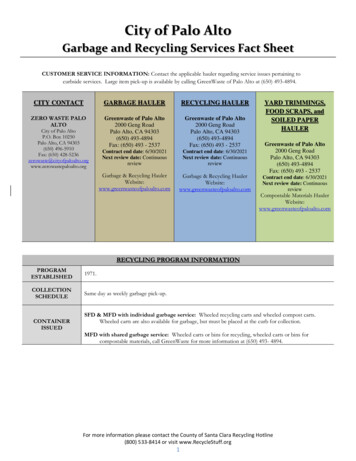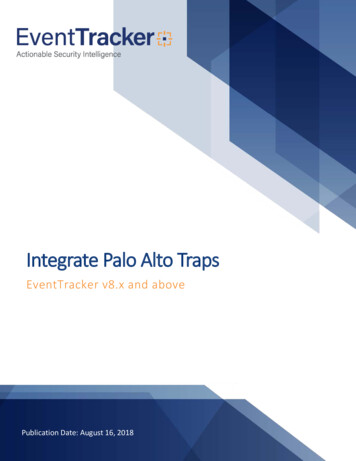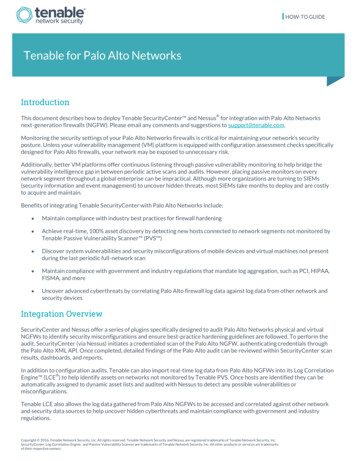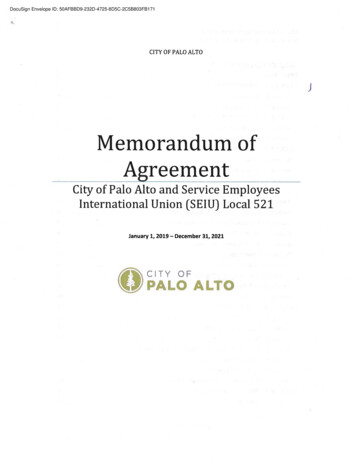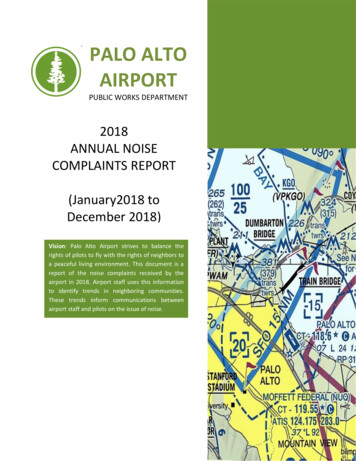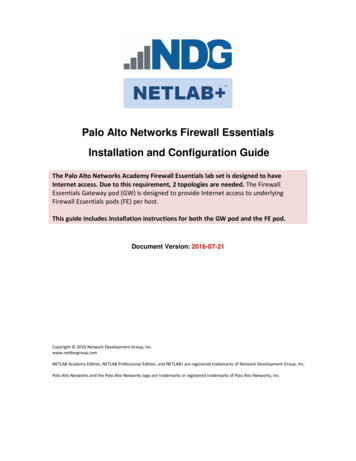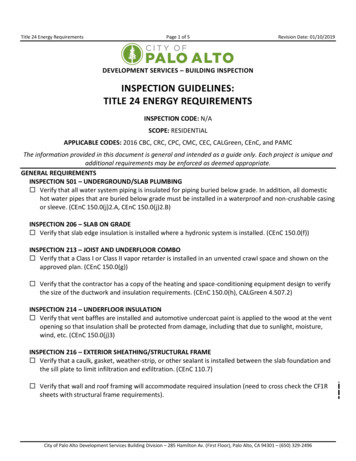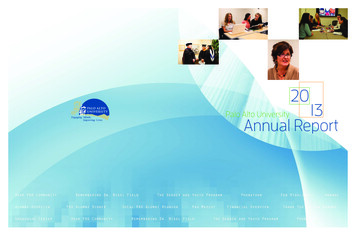
Transcription
2013Annual ReportPalo Alto University[2]2013 PAU AnnualReport R2.indd 2-3[3]2/16/14 7:55 PM
Dear PAU CommunityIam very proud of the advancements Palo Alto University made in the 2012-2013academic year. The talent and commitment of the university’s students, faculty,staff, and board of speak for themselves in the way the university operates, focuseson growth, and its commitment to the community. We saw our enrollmentnumbers increase, we recruited some fine additions to our faculty, we successfullycompleted a 1 million endowment campaign to support the Gronowski Center,and we made significant strides to grow our degree programs to meet theever-changing needs of our students and the community at large.A value that I live by every day encompasses how I see Palo Alto University.Leviticus 19:16 tells us: “thou shalt not stand idly by while thy neighbor bleeds.”Palo Alto University exemplifies this statement in how it operates throughoutthe world. While Haiti does its best to rebuild after the devastating earthquakein 2010, a group of six of our students went out to the Caribbean country to helpbuild houses. In Thailand and Cambodia, faculty member Nigel Field and hisstudents carried out extensive research, examining complicated grief and PTSDstemming from genocide during the Khmer Rouge regime. In our own community,our Gronowski Center gives our students the opportunity to receive valuableclinical training in the field of mental health while they concurrently offertherapeutic services to individuals throughout the Bay Area.It has been my pleasure to be president of this institution for the past thirty years.I have seen it grow from one degree program serving about forty students toa full-fledged university, offering graduate as well as undergraduate degrees,serving over 800 students. PAU has made a marked impact on society in the areaof mental health. And our work is not finished. We will continue not to stand idlyby while the world needs help.Allen D. Calvin, Ph.D.PresidentPalo Alto University[2][2]2013 PAU AnnualReport R2.indd 2-3[3][3]2/16/14 7:55 PM
I4 Health at PAUGood Paths to a Healthier LifeThe Gender and Youth Program:Supporting the Voice of Transgender YouthAClosing the Gap:Reducing global health disparitiess adults, we can look back on our teen years and remember how they broughtchallenges and trying times. Everyone wants to be accepted, to be liked. Everyoneis trying to find out who they are and express that in the world. For transgenderyouth, this journey can be extremely challenging.Due to geographic and economic obstacles, most people around the world donot have proper access to health or mental health services. One of the first stepstoward reducing global health disparities is to provide self-help tools at little-to-nocost to the user. By using the Internet and mobile application technology, our teamis committed to developing, testing, and making available to the public behavioraland mental health interventions that can be used again and again by anyone whoneeds them around the world.Our Roots:Reaching Many with Non-Consumable Health ServicesIt all began in 1998 at the University of California, San Francisco, Department of Psychiatry. In an effort to create a nonconsumable health service that could reach manyand cost little, Ricardo Muñoz and a team of colleagues created a smoking cessationwebsite. The website has since grown and evolved, now, having helped thousandsof people all over the world quit smoking in English, Spanish, Russian and Chinese.The AmericasTotal impressions 6,286,765By CountryNo Data1 - 2,5022,503 - 154,195154,196 - 509,260509,261 - 815,774815,775 - 2,992,892Map: Counties reached through our stop smokingwebsite (www.stopsmoking.ucsf.edu) from2003 – 2011Since the establishment of the website, Ricardo and his Latino Mental Health Research Program have worked toward meetinghealth and mental health needs around the world through global mindedness, technology and innovation. Projects havefocused on depression prevention and treatment and smoking cessation, using internet and mobile phone technology.I4health, established in 2012,works towards further developing the websites and apps conceived by the LMHRP, as well asdevising new ways to reach people around the world and meet their health and mental health needs.Making of the Team:What makes i4health strong is our diverse team. Bringing PAU faculty, staff, and students together, our individual experiences,cultural background and skillsets combine to give us a unique perspective on global health issues and a propensity forinnovation. In addition to our diverse local team, we are collaborating with teams abroad, including Prof. Eduardo Bunge’steam in Buenos Aires, Argentina, la Fundación Equipo de Terapia Cognitiva Infantil-Juvenil, as well as Prof. Lucy Yardley andProf. Adam Geraghty’s team at the University of Southampton in the UK. We are also looking forward to working with Prof.Carmem Beatriz Neufeld of the University of São Paulo.Remembering Dr. Nigel FieldIn December2013, Palo AltoUniversity losta talented anddedicated facultymember, and awonderful friend,Dr. Nigel Field.Dr. Nigel Field, Professor, received hisPh.D. in clinical psychology at YorkUniversity in Toronto, Canada. He did apostdoctoral fellowship at UCSF with theMcArthur Foundation funded Programon Conscious and Unconscious MentalProcesses directed by Dr. Mardi Horowitzprior to his position as a full-time faculty[4]2013 PAU AnnualReport R2.indd 4-5member at Pacific Graduate SchoolPsychology, Palo Alto University (PAU),in September 1995. Dr. Field’s area ofexpertise was in bereavement, withfocus on spousal bereavement, childloss and pet loss. He was one of the firstinvestigators to develop the concept ofthe continuing bond. More recently, Dr.Field extended his program of researchto Thailand and Cambodia. As part ofthis work, he examined complicatedgrief and PTSD stemming from genocide during the Khmer Rouge regime inCambodia. He was the Associate Editorfor Death Studies and a member of theeditorial board of Journal of Loss andTrauma. At PAU, he taught classes inBrief Dynamic Psychotherapy, ClinicalGroup Supervision, PsychodynamicPsychotherapy, Social Psychology,Theories of Personality, and Cognitiveand Affective Bases of Behavior.Dr. Nigel Field loved working with hisstudents and is responsible for manystudents becoming clinical psychologists. In his memory and gratitude for hiswork at PAU, President Dr. Allen Calvinhas created a 50,000 student fellowshipin Nigel Field’s name. In addition, aStudent Assistantship Award will bemade in his honor. Dr. Field will bemissed by those of us privileged tolearn from him and work with him.For transgender and gender-nonconforming youth, trying to find and explainwho they truly are to their family and social circles can be extremely difficult anduncomfortable. These youth have been shown to be at risk for high levels ofdistress, with approximately one-third reporting that they have attempted suicide.These concerning rates of distress have been shown to relate to experiences ofgender-based victimization, discrimination, and family and peer rejection. To date,a serious lack of evidence-based interventions remains to address mental healthconcerns among transgender and gender-nonconforming youth.Rylan Testa, Ph.D. Program Manager,Gender Identity ProgramPAU is proud to highlight the work of the Gender and Youth Program, designed tosupport transgender and gender non-conforming youth both mentally andemotionally. Faculty member Peter Goldblum, Ph.D., MPH, is the Program Directorand Lead Principal Investigator and Rylan Testa, Ph.D. is the Project Coordinator.The program develops, evaluates, and disseminates interventions that reducepsychological distress and increase resilience among transgender and gendernonconforming youth.25The Gender and Youth Program’s vision is that all youth will have the social and emotionalresources to develop and express positive identities congruent with their true selves.15In partnership with national researchers, data on national and statewide samplesof transgender and gender nonconforming people were analyzed to betterunderstand factors that drive distress and that promote resilience in transgenderand gender non-conforming individuals. Findings were published as articles inpeer-reviewed journals with wide readership. Articles covered subjects such as:risk and resilience during transgender identity development, in-school genderbased victimization and suicide attempts among transgender people, the effectsof violence on transgender people, and understanding risk and resiliency intransgender and gender non-conforming individuals.The past year’s efforts of the Gender and Youth Program have focused on development of an intervention to address the factors found to drive distress and resilience in transgender and gender nonconforming youth. In order to be accessibleto all transgender and gender nonconforming youth, this intervention has beenformatted as a workbook, written to serve as a self-help resource for those who areunable to access culturally competent clinical services, and as a client workbookfor those who are able to engage in services to address gender-related distress. Acompanion manual is also being created for clinicians working with these clients.201050FTMMTFGender KnowledgeGender IgnoranceTransgender people given access knowledgeabout gender diversity were about half aslikely to experience suicidality during theiridentity development process.Utilization of the workbook and clinician companion manual will be piloted,working with transgender and gender nonconforming clients presenting fortherapy at Palo Alto University’s Gronowski Center and partnering providers.Outcome data for different aspects of the clinic-based protocols will be assessedand evidence-based treatment protocols will be disseminated widely.Internet-based resources will begin development. Elements of the evidence-basedintervention will be expanded and disseminated online in a format most engaging toyouth, incorporating aspects such as gaming and social media. Internet-based resources will complement clinic-based treatment as well as further extend services to thosewho cannot access clinic-based psychotherapy, allowing the GYP to best serve thebroadest population of youth with deepest effectiveness and sustainable efficiency.[5]2/16/14 7:55 PM
PhonathonAwardsFew HighlightsIn May 2013 we had our first AnnualPhonathon. Our students’ contactedPAU alumni throughout the country tobuild relationships, provide updates oncampus events and news, and securesupport for the Gronowski Center. Wereceived a lot of good feedback fromour alumni about their experience andhow they would like to be involved withPAU. We received 128 new gifts, and weare very grateful for the generosity ofPAU alumni. Their support contributedsignificantly to the Gronowski CenterQuasi-Endowment.Our Masters Program hired two new faculty members, while expanding thenumber of degree programs and student enrollment. The online Masters inCounseling program added two new emphasis areas: Addiction & Recovery andCross-Cultural Trauma & Crisis Counseling. PAU launched a Masters in CounselingPsychology program in San Mateo bringing it to three campuses. PAU has addedoutreach to Latin America through Global Advancement of Counseling Excellence.PAU’S Global online Masters programs are not only serving students primarily inCalifornia, but also in a dozen other states as well as France, Germany, Norway,Israel, Uruguay, Argentina, India, Japan, and China. CAFÉ (The Child and Family Emphasis) is very proud to be sponsoring twochildren through the Save the Children Organization. This Winter quarter, four distinguished students in Dr. Robert Friedberg’sresearch group and the Center for the Study and Treatment of Anxious Youth(CSTAY) presented at the second Annual International Conference on Cognitiveand Behavioral Psychology (CBP) in Singapore. Ph.D. students Nina Pacholec,Lisa Hoyman, Rosa Poggesi, and Melissa Tamas each presented their own papersat the conference.On the evening of March 7th, 2013 the PAU Alumni Awards Dinner honored six outstanding alumni who have madenotable contributions to the field of psychology. The honorees demonstrated outstanding achievements in areas of“Creating Compassionate Global Communities,” the theme of the Alumni Honor Awards.Award Winners included:CAPT. Scott L. Johnston, Ph.D.a clinical psychologist, and theDirector of the Naval Center forCombat & Operational StressControl (NCCOSC).[6][6]2013 PAU AnnualReport R2.indd 6-7Lisa Brown, Ph.D.Chair of the University of South FloridaResearch Counciland member of theSenate ExecutiveCommittee.Maggie Chartier,Psy.D., MPHNational ProgramCoordinator for theVeteran Health Administration’s in the Officeof Public Health.Eval Gal-Oz, Ph.D.Adjunct clinical facultyStanford departmentof Psychiatry andBehavioral Sciencesand privatepractice in Palo Alto.Assistant Professor Joyce Chu earnedthe Asian American Psychological Association’s (AAPA) Early Career Award forDistinguished Contribution to Research.Dr. Chu was selected for this award fordemonstrating outstanding achievement in research and scholarship forsomeone so young in her career. Dr.Chu runs PAU’S Ethnic Minority MentalHealth Research Group and co-leadsPAU’S Multicultural Suicide ResearchCenter. Her research is focused aroundunderstanding and improving mentalhealth services for ethnic minorityindividuals with depression, particularlyamong older adults and Asians.Alumni OverviewPAU Alumni Awards DinnerMichael Kerner, Ph.D.a Clinical and ForensicPsychologist with apractice in San Jose forover 27 years.Professor Peter Goldblum earned theAPA’s Division 44 Distinguished Contributions to Education and TrainingAward. Division 44 is the Society for thePsychological Study of Lesbian, Gay,Bisexual and Transgender (LGBT) issues.Dr. Goldblum also co-directs CLEAR(the Center for LGBTQ Evidence-basedApplied Research), which also receiveda Presidential Citation by Dr. Noriega.CLEAR was launched by PAU in 2007to conduct applied research that hasa direct impact on the mental healthand wellbeing of LGBT and Questioning(LGBTQ) individuals and their families.Jorge Wong,Ph.D., CCEP, CHCDirector of Clinical andRegulatory Affairs atAsian Americans forCommunity Involvement(AACI).During the 2012-2013 academic year the Office of Alumni Relations had some majordevelopments and advances in our mission to provide our graduates with support andalumni services on their paths following graduation from Palo Alto University.SoCal PAU Alumni ReunionOn the evening of February 16, 2013 the first annual Southern California PAUAlumni Reunion took place, providing a space to connect for graduates whomigrated south to continue their exceptional work in psychology. The event waswell attended and included graduates from multiple graduates from differentPAU programs. This event will occur annually and we hope to continue to expandand support our alumni who work in the Southern California area.PAU MascotThe verdict is in and the students have spoken. Palo Alto University’s officialmascot is the Mountain Lion. Indigenous to Northern California, this wild felinerepresents the strength, agility and determination of our University. Thank youto PAU Ph.D. student Rossa Poggesi for coming up with the designed.Financial OverviewFiscal year 2012-13 reflected a substantial increase in enrollment and relatedRevenues and Expenses. Revenues totaling 24.7M (after discounts) were up13% from 2011-2012. Expenses totaling 24.6M were up 25% from 2010-2011.Contribution to Net Assets for the 2012-2013 year was 108K.[7][7]2/16/14 7:55 PM
Gronowski Center Board DesignatedEndowment Fund DonorsJim & Julia BreckenridgeAllen & Dorothy CalvinWilliam FromingDavid & Karen Gronowski( 50,000 )Stephen & Katy GronowskiJune KleinJennifer & Meredith OrthweinJames & Maren Otieno( 25,000- 49,999)Richard Lonergan & Marilyn Manning LonerganPat & Ricardo MunozMegan O’MahonyAnonymousRoger & Tracy BeckerDenise DanielsLuli Emmons & Frank GraetchRowena Gomez & Joseph SalazarLeslie KoonceBerton & Ingrid KeithKathryn PryorDacien & Tamara SimsHelena & Alan TingHood and Strong LLPJosé R. Llanes, Jr.Jorge Wong( 10,000- 24,999)Gronowski CenterWe are pleased to report that Palo Alto University has reached its goal ofraising 1 million for the board-designated endowment to support the GronowskiCenter in perpetuity, so that we can guarantee its services for years to come.Thank you to our donors because of whom we were able to achieve our goal.The Gronowski Center is named in honor of former PAU board member KurtGronowski, and his wife, Barbara. The center carries on their tradition of generosityand community service. Our students receive valuable, hands-on training at theGronowski Center through providing counseling services to clients throughout thecommunity. The Gronowski Center offers services on a sliding fee scale as a partof its mission to serve the mental health needs of our community, regardless ofpeople’s ability to pay. Services are provided by doctoral level students under thesupervision of licensed psychologists. Within the center, there are various specialtyclinics that serve specific needs that are pertinent to our community. For example,the Sexual and Gender Identities Clinic offers supportive services to individualswho identify as gay, lesbian, bisexual or transgender. We also have a PTSD/TraumaEarly Intervention research group at the center. About 76 student therapists workat the Gronowski Center, and collectively serve about 340 clients per week.To further our reach in the community, PAU is partnering with Palo Alto MedicalFoundation, Arbor Free Clinic-Stanford and El Camino Hospital to have them referpatients to the Gronowski Center for mental health services. We wish to acknowledge the individual, corporate and foundation supporters whose charitablecontributions and pledges between August 1, 2012 and July 31, 2013 helped raisethe Gronowski Center Board-Designated Endowment fund to 1,000,000.00 goal.[8][8]2013 PAU AnnualReport R2.indd 8-9Comerica BankRita & Perril FrenchIris & Hal KorolJohn A. GambsChristopher BarrMary & Harry BlanchardLisa M. BrownSusan CronholmAnne HalstedLandon BergerJoanne ChanJennifer CoughlinCherry Love DelaCruzNeysa ElyLauren FeinerLynn FraleyCasey GlovinJohn HamiltonShelly L HirschbergD. Pamlyn KellyGeoffrey Lane( 5,000- 9,999)( 2,500- 4,999)( 1,000- 2,499)( 500- 999)( 100- 499)( 1- 99)John KrumboltzStanley SueDonald MaccleanJohn ParkerEllen Shuck & Peter HaleyIrene TibbitsRebecca Melody LeibDona MalanBrandi MarcalettiTuquyen NguyenYana PelegRussell RicciTiffany RideauxStephanie ShippenLori Kathlenn ThiemannJennifer TranTom ZimmermanPlease note that this report includes total gifts and pledges raised for the Gronowski Center Board Designated Endowment Fund.[9][9]2/16/14 7:56 PM
Thank You To Our Donors!We wish to acknowledge the 113 individual, corporate and foundation supporters whose charitable contributionsreceived between August 1, 2012 and July 31, 2013 helped fund scholarships, fellowships, new program initiatives and otherfacets of PAU’s capacity for improving lives through education, research and community service. Because PAU is revenueneutral in its current operations, the annual contributions listed below represent a true investment in PAU’s ongoing ability toimprove lives.President’s Circle ( 50,000 )John Sperling*Gary and Dana Shapiro*Dean’s Circle ( 25,000- 49,999)Allen and Dorothy Calvin*County of Santa Clara Mental Health*Barbara Gronowski*Sharon HasslenThe Koret FoundationSage ( 10,000- 24,999)David and Karen Gronowski*Stephen Gronowski*Hewlett Packard CompanyJennifer and Meredith OrthweinMaren and James Otieno*Scholar ( 5,000- 9,999)AnonymousLarry E. Beutler*Peter Goldblum*Michael Kerner*June Klein*Raquel Newman*Peter Orthwein*Gordon Rausser*Joseph and Kate Tyrrell*Lynn Waelde*Philosopher ( 2,500- 4,999)Leonard & Sandy Beckum*Eric ChapmanCarolyn ClineWilliam Froming*June Klein*Naz Motayar & Habib ZakeraniDaniel & Robin Kostenbauder*Lee Ross*Fred & Kathy Seddiqui*Michael J. Vartain*AnonymousMartin & Jill Dodd*Rowena Gomez & Joseph Salazar*Stephen & Beverley HartmenRoger & Christine KiddLeslie Koonce*Iris & Hal KorolRichard & Marilyn Manning LonerganJosé R. Llanes Jr.*Pat & Ricardo F. Munoz*Racquel NewmanJanice Pettey*Kathryn PryorProfessional & Educational Services International IncCharles ReedAllen Weiner*Thinker ( 1,000- 2,499)Friend ( 500- 999)Kimberly BalsamJohn A.GambsMartha Kanter*John KrumboltzSteve LovettLouis MoffettEllen ShuckStanley SuePamela Swales*Ralph WolffSan Francisco Pride Celebration CommitteeContributor ( 100- 499)AnonymousChristopher BarrJohn BenderMary BlanchardLisa M.BrownNancy CollinsGilian CouvillionNicholas and Gretcher CovinoSusan CronholmAnne HalstedMatt LevineLuttickens MarketAnonymousLandon BergerJoanne ChanHilarie ConnollyJennifer CoughlinCherry Love DelacruzNeysa ElyLauren FeinerLynn FraleyCasey GlovinJohn HamiltonShelly L HirschbergPhilip KeithD. Pamlyn KellyGeoffrey LaneRebecca leibRicardo MunozDonal MaccleanLouis MoffetJohn ParkerShirley TartakLarry ThompsonIrene TibbitsTaceta TormalaCatherine WalkerJorge WongLawrence YabroffColleague ( 1- 99)Rayna MacherDona MalanBrandi MarcalettiTuQuyen NguyenMegan O’MahonyYana PelegDarryl ReedRussell RicciTiffany RideauxKaren SavageStephanie ShippenLori Kathleen ThiemannHelena & Alan TingHui Qi TongJennifer TranTom Zimmerman* Names with an asterisk indicate a contribution received that is part of a multi-year commitment.[10][10]2013 PAU AnnualReport R2.indd 10-11[11][11]2/16/14 7:56 PM
I4 Health at PAU Good Paths to a Healthier Life Closing the Gap: Reducing global health disparities D ue to geographic and economic obstacles, most people around the world do not have proper access to health or mental health services. One of the first steps toward reducing global health disparities is to provide self-help tools at little-to-no
